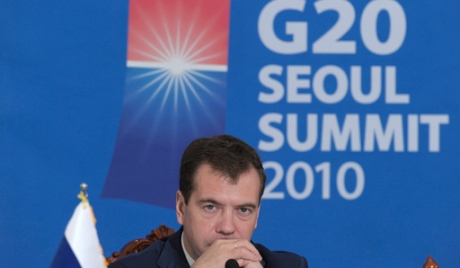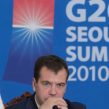
Medvedev Adrift in a Sea of Economic Multi-polarity
Publication: Eurasia Daily Monitor Volume: 7 Issue: 207
By:

The G20 summit in Seoul last week was outstanding in its intensity of divergences that this crisis-born institution sought to harmonize. The US unfortunate unilateralism in money-making and China’s shameless currency manipulation, the prudence of budget austerity and the need in stimulating stalled growth, irreducible trade deficits and unenforceable regulation of global finances –all these issues were furiously debated by the leaders of world’s major economic powers without any satisfactory resolution (Ekspert, Vremya Novostei, November 12). President, Dmitry Medvedev, had very little to say on any point of that overloaded agenda (Kommersant, November 13).
Nor did Medvedev underestimate Russia’s exposure to and vulnerability from the volatility of the global economy, but it is objectively difficult to decide what position in the multiple economic divides would serve best diverging Russian interests. For instance, Moscow has good reasons to object to weakening the US dollar as it reduces the value of its reserves. At the same time, the over-supply of this currency due to the “quantitative easing” experiment of the Federal Reserve System might create a new bubble on the global oil market –and this is exactly what the Russian leadership needs for the delicate election period in 2011-2012 (www.newsru.com, November 12).
Russia is not altogether satisfied with the central role of the G20 in managing the global economy since its privileges in the old G8 format are diluted (www.gazeta.ru, November 11). It has always been, however, an awkward outsider in the club of rich democracies, but now Moscow finds itself as a “sick economy” also in the newly-born BRIC (Brazil, Russia, India, China) organization, which has agreed to accept South Africa as its fifth member (RIA Novosti, November 12). From Seoul Medvedev traveled to Yokohama for the Asia-Pacific Economic Cooperation summit, and at this forum he had to deal not only with the fact of Russia’s poor involvement in these fast-growing trade and investment flows but also with the embarrassing consequences of the diplomatic row with Japan over his recent trip to the disputed island of Kunashir (www.gazeta.ru, November 12).
Russia’s isolation in international summits, which continue in the coming weeks with the NATO summit at Lisbon and the Organization for Security and Cooperation in Europe (OSCE) summit in Astana, is caused not so much by its deliberate parochialism as by the muddle in its economic policy. Medvedev’s big idea of “modernization” has lost momentum and is reduced to virtual construction of one “wonder-village” in Skolkovo, and no one expects inspirational resonance from the address to the parliament that Medvedev is due to deliver later this month in a short “window” between foreign trips (Nezavisimaya Gazeta, November 12). The investment climate in Russia remains severely affected by bureaucratic predation, so the authoritative “Doing Business” index published last week downgraded it to the 123rd place among 183 (Kommersant, November 8). The continuing outflow of investment capital condemns Russia to slow growth in years to come, and this “new norm” contrasts sharply with the exuberant prosperity of the mid-2000’s, as well as necessitates significant adjustments in the government’s spending habits (Vedomosti, November 10).
Perhaps the most basic contradiction in Russian economic policy is the imperative to increase tax on the oil-and-gas sector in order to keep the budget deficit in check, which clashed with the need to invest more in the “upstream” in order to sustain falling production. Russia is positioning itself as an industrial state rather than as a raw materials exporter in the international arena, but the main content of its foreign policy is based on its energy contracts. Medvedev will negotiate in Lisbon on anti-missile defense, which quite probably will never come into being in Europe, but of far greater practical importance was Putin’s visit to Sofia, where the deal on the South Stream pipeline was moved forward (Kommersant, November 13). The choice on investing in this hugely expensive pipeline or on modernizing the gas infrastructure in Ukraine will be the crucial foreign policy decision in 2011 (RBC Daily, November 12). A prospect that Putin stubbornly refuses to take into account in making this choice is the falling gross demand for gas in the EU, which is outlined in many directives, but Gazprom still counts on extra-high profits in this market (Vedomosti, November 11).
The reality of shrinking petro-revenues is inevitably translated into the proposition to reduce the social obligations of the state, but neither Putin nor Medvedev is prepared to spell out this message as yet, preferring to demonstrate kind attention to the dispossessed. Evgeny Gontmakher, the most outspoken expert on social-economic issues, predicts that after the 2011-2012 electoral extravaganzas, a “cold shower” of cuts in budget allocation is sure to come (Novaya Gazeta, November 10). Many European states are now facing the unpleasant prospect that their working classes would have to labor longer and harder for less income, but in Russia this imperative has to be formulated by the elites that are seriously compromised by their shameless corruption and “how-to-spend-it” lifestyle (www.gazeta.ru, November 10). Indeed, even the doctored official statistics shows that in Russia the richest 10 percent earn 17 times more than the poorest 10 percent, while in Kazakhstan this key indicator of social inequality is only 5.3 percent (Nezavisimaya Gazeta, November 11).
Discontent with this hyper-concentration of wealth in the hands of self-serving elites is growing and takes different forms, for instance the mobilization of media of all persuasions behind the demand to investigate the brutal beating of Kommersant journalist Oleg Kashin, which leads to further demands for greater freedom of the press. Medvedev is trying to win public support by demonstrating personal attention to this investigation, but the impression is spoiled by the presence of Vladislav Surkov, deputy head of his administration, who is directing media censorship and controlling the activities of “patriotic” youth movements, at every occasion where the president is presenting a “liberal” face (www.grani.ru, November 9). Medvedev’s membership in the cabal of “masters” of state power is too transparent to make his quasi-democratic populism any more credible than his pretence for a major presence at tough-talking summits. The time for economic free-riding has passed, but Putin’s Russia is still stuck in it.




